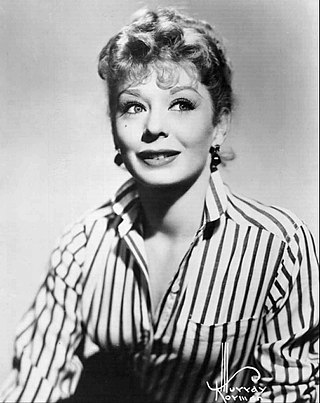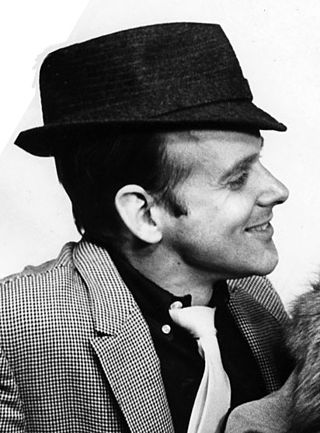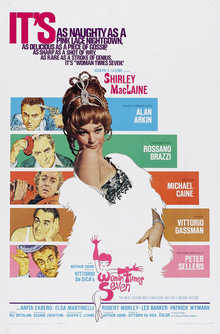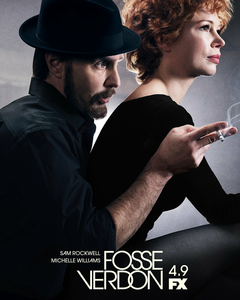
Gwyneth Evelyn "Gwen" Verdon was an American actress and dancer. She won four Tony Awards for her musical comedy performances, and she served as an uncredited choreographer's assistant and specialty dance coach for theater and film. Verdon was a critically acclaimed performer on Broadway in the 1950s, 1960s, and 1970s, having originated many roles in musicals, including Lola in Damn Yankees, the title character in Sweet Charity, and Roxie Hart in Chicago.

All That Jazz is a 1979 American musical drama film directed by Bob Fosse and starring Roy Scheider. The screenplay, by Robert Alan Aurthur and Fosse, is a semi-autobiographical fantasy based on aspects of Fosse's life and career as a dancer, choreographer and director. The film was inspired by Fosse's manic effort to edit his film Lenny while simultaneously staging the 1975 Broadway musical Chicago. It borrows its title from the Kander and Ebb tune "All That Jazz" in that production.

Robert Louis Fosse was an American actor, choreographer, dancer, and film and stage director. He directed and choreographed musical works on stage and screen, including the stage musicals The Pajama Game (1954), Damn Yankees (1955), How to Succeed in Business Without Really Trying (1961), Sweet Charity (1966), Pippin (1972), and Chicago (1975). He directed the films Sweet Charity (1969), Cabaret (1972), Lenny (1974), All That Jazz (1979), and Star 80 (1983).
Carol Haney was an American dancer and actress. After assisting Gene Kelly in choreographing films, Haney won a Tony Award for her role in Broadway's The Pajama Game, while later work as a stage choreographer earned her three Tony nominations.

Shirley MacLaine is an American actress and author. Known for her portrayals of quirky, strong-willed and eccentric women, she has received numerous accolades over her eight-decade career, including an Academy Award, an Emmy Award, two BAFTA Awards, six Golden Globe Awards, two Volpi Cups and two Silver Bears. She has been honored with the Film Society of Lincoln Center Tribute in 1995, the Cecil B. DeMille Award in 1998, the AFI Life Achievement Award in 2012, and the Kennedy Center Honor in 2013.

Sweet Charity is a musical with music by Cy Coleman, lyrics by Dorothy Fields and book by Neil Simon. It was directed and choreographed for Broadway by Bob Fosse starring his wife and muse Gwen Verdon alongside John McMartin. It is based on the screenplay for the 1957 Italian film Nights of Cabiria. However, whereas Federico Fellini's black-and-white film concerns the romantic ups-and-downs of an ever-hopeful prostitute, in the musical the central character is a dancer-for-hire at a Times Square dance hall. The musical premiered on Broadway in 1966, where it was nominated for nine Tony Awards, winning the Tony Award for Best Choreography. The production also ran in the West End as well as having revivals and international productions.
The Frug was a dance craze from the mid-1960s, which included vigorous dance to pop music. It evolved from another dance of the era, the Chicken. The Chicken, which featured lateral body movements, was used primarily as a change of pace step while doing the Twist. As young dancers grew more tired they would do less work, moving only their hips while standing in place. They then started making up arm movements for the dance, which prompted the birth of the Swim, the Monkey, the Dog, the Watusi, the Mashed Potato, and the Jerk. The Frug is sometimes referred to as the Surf, Big Bea, and the Thunderbird.

Dolores Conchita Figueroa del Rivero, known professionally as Chita Rivera, was an American actress, singer, and dancer. Rivera received numerous accolades including two Tony Awards, two Drama Desk Awards, and a Drama League Award. She was the first Latina and the first Latino American to receive a Kennedy Center Honor in 2002, and the Presidential Medal of Freedom in 2009. She won the Tony Award for Lifetime Achievement in 2018.

Nights of Cabiria is a 1957 drama film co-written and directed by Federico Fellini. It stars Giulietta Masina as Cabiria, a prostitute living in Rome. The cast also features François Périer and Amedeo Nazzari. The film is based on a story by Fellini, who expanded it into a screenplay along with his co-writers Ennio Flaiano, Tullio Pinelli and Pier Paolo Pasolini.

Ann Reinking was an American dancer, actress, choreographer, and singer. She worked predominantly in musical theater, starring in Broadway productions such as Coco (1969), Over Here! (1974), Goodtime Charley (1975), Chicago (1977), Dancin' (1978), and Sweet Charity (1986).

Sandahl Bergman is an American actress and dancer. She is best known for her role as Valeria in the film Conan the Barbarian (1982), for which she won a Golden Globe and a Saturn Award.

Joan Hume McCracken was an American dancer and actress who became famous for her role as Sylvie in the original 1943 production of Oklahoma! She also was noted for her performances in the Broadway shows Bloomer Girl (1944), Billion Dollar Baby (1945) and Dance Me a Song (1950), and the films Hollywood Canteen (1945) and Good News (1947).

John Francis McMartin was an American actor of stage, film and television.
"If My Friends Could See Me Now", with music by Cy Coleman and lyrics by Dorothy Fields, is a song from the 1966 Broadway musical Sweet Charity. In the musical the character of Charity, played in the original New York cast by Gwen Verdon, reflects on her marvellous luck as she spends time with Vittorio. In the 1969 film adaptation of Sweet Charity, "If My Friends Could See Me Now" is performed by Shirley MacLaine.

Woman Times Seven is a 1967 sex comedy anthology film directed by Vittorio De Sica. It consists of seven segments, all starring Shirley MacLaine, most of which deal with aspects of adultery.
Lenora Nemetz is an American stage and musical theatre actress.
Kathryn Doby is a Hungarian dancer, actress and choreographer who worked as assistant and dance captain for Bob Fosse. She made her Broadway debut in the ensemble of Fosse's Sweet Charity at its premiere in January 1966 at the Palace Theatre in Times Square. Aside from her performance in the musical Gregory (1970), her work on Broadway continued with Fosse as a Player and Dance Captain in Pippin (1972) and as an assistant to Mr. Fosse for Chicago (1975) and Dancin' (1978). Her film credits include The Night They Raided Minsky's – “Minsky Girl” (1968), The Handmaid's Tale (film) – Aunt Elizabeth (1990), and again worked with Fosse as a dancer in Sweet Charity (1969), Cabaret – Kit Kat Dancer (1972), and All That Jazz – Kathryn (1979).

Fosse/Verdon is an American biographical miniseries starring Sam Rockwell as director–choreographer Bob Fosse and Michelle Williams as actress and dancer Gwen Verdon. The series, which tells the story of the couple's troubled personal and professional relationship, is based on the biography Fosse by Sam Wasson. Norbert Leo Butz and Margaret Qualley are also featured as Paddy Chayefsky and Ann Reinking, respectively. It premiered in eight parts on April 9, 2019, on FX.

Star-Spangled Women for McGovern–Shriver was a political variety show held on October 27, 1972, produced by Shirley MacLaine and Sid Bernstein as a late-campaign push to help the 1972 presidential campaign of George McGovern, running as the peace candidate. Also known as Star-Spangled Women for McGovern and simply Star-Spangled Women, the concert drew a near-capacity crowd at Madison Square Garden in New York City. With a dozen singing, dancing and spoken-word performances, rock journalist Lillian Roxon described the show as "one thunderbolt after another."















